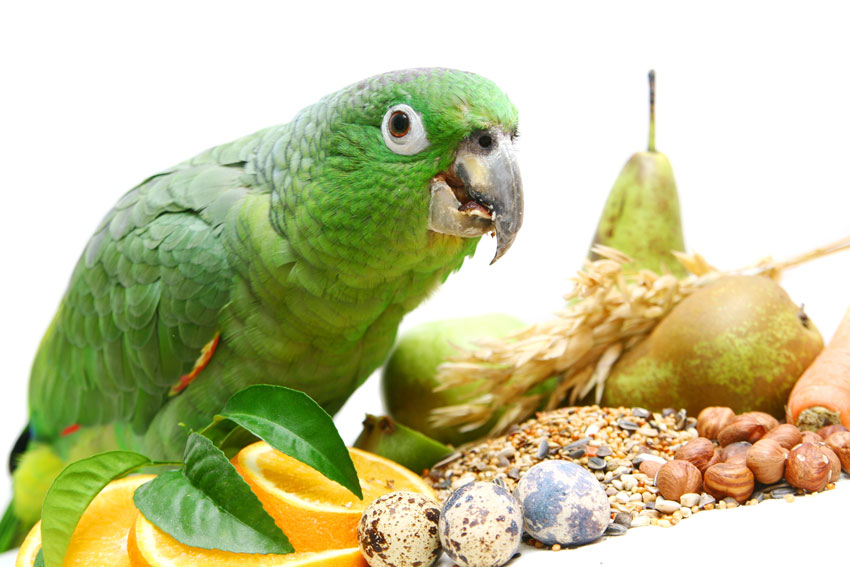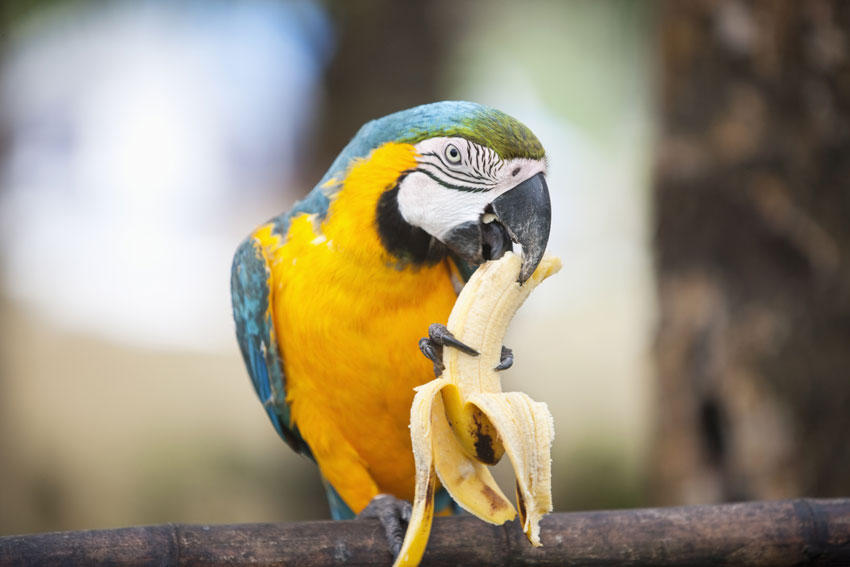The food we provide is a fundamental factor in determining how healthy our parrot is and for how long he will live, improper nutrition is the main cause of death among caged birds.
An improper diet is very dangerous for these birds because it brings about dietary deficiencies that lead to weakness and can put their immune system at risk, resulting in a wide array of problems. Let’s see what we should do and what we should absolutely avoid.
– DEBUNKING CLICHES
The widespread notion we most need to correct is that a diet based on a mix of dried seeds is all a parrot needs. This kind of food, which is quick and easy to dish out, is lacking in several very important nutritional elements like protein, calcium and various vitamins, especially A and C. Not only, but if the diet is particularly rich in oily seeds, like sunflower seeds, then it’s too fatty and the bird is getting an overload of calories.
Another myth to be challenged is that a parrot will eat only what he needs, that is, knows and will choose only what’s good for him all by himself. This may be true of those who live free in their own natural habitat in the wild but, seeing as the ones we’re talking about have only us to depend on and lack the natural instincts of free birds, our feathered friend does not, in fact, know what is good or bad for him. Like any other creature, he probably prefers the things he likes the most, but these may not contain the right nutrients, like the sunflowers or dry fruit.
Remember that a parrot’s life expectancy is in direct proportion to his size. It’s quite normal for a Macaw or Cockatoo, for example, to live to be fifty years old, so if you’ve been feeding him a mixture of seeds and he dies at 15 or 20, well, that’s not exactly a long life.
– PROPER NUTRITION
So what should we be feeding our parrots? Not all species have the same needs, and even within a species needs can be different depending on the age and physical condition of the individual. So before you rush out to change his diet, take him to see a specialised veterinarian and see what he or she has to say about it.
On the whole, with the exception of a few species of parrot, a varied and balanced diet is just what he needs. After all, that’s what’s best for us too, isn’t it? They will be needing some fruit (but never avocado as it is poison to them), raw or cooked veggies (better if seasonal), mixed and well-cooked legumes (makes them easier for him to digest), animal protein (cooked lean meat, cooked fish, natural tuna and hard-boiled eggs), carbohydrates (cooked cereal, non-sugared oats, cooked whole grain pasta and rice, boiled potatoes) and small amounts of seeds. Dry fruit and oily seeds can be given to him now and again, as a special treat.
This diet does mean you have a bit more work to do, but it really is worthwhile if you consider that your beautiful bird will lead a much healthier and happier life. If it makes it any easier, you can prepare and store his food in the fridge, just make sure you serve it to him at room temperature, he likes it better that way.
Instead of cooking it all up yourself, you can actually serve him a diet of quality pellets. And to make sure he doesn’t get bored with that as a diet, alternate it with some of the above foods for variety. He needs that, not just from a nutritional standpoint, but a psychological one too. After all, in the long run, eating boring old pellets can get quite boring. Who can blame him?


